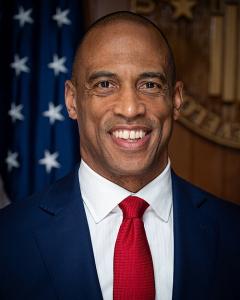Small Landlords Challenge D.C. Rent Control Bill; Call for HUD Review
Association says the proposal violates federal housing law, threatens voucher families, and deepens segregation across the District
This is the new redlining—regulation replacing old discrimination. The bill locks voucher families out of better neighborhoods under the guise of reform.”
WASHINGTON, DC, UNITED STATES, October 30, 2025 /EINPresswire.com/ -- In a rare federal appeal, the Small Multifamily Owners Association (SMOA) has called on the U.S. Department of Housing and Urban Development (HUD) to determine whether the District of Columbia’s Rent Stabilization Protection Amendment Act of 2025 (Bill 26-0070) violates federal housing law and fair housing principles.— Dean Hunter, CEO, Small Multifamily Owners Association
In a formal request to HUD Secretary Scott Turner and General Counsel David Woll, the association argues that the D.C. Council’s proposal “intrudes upon a field fully occupied by federal housing law” by extending local rent control and penalties to federally regulated Housing Choice Voucher Program (HCVP) units.
“This bill would make the District of Columbia the first jurisdiction in the nation — setting a dangerous national precedent — to impose rent control on federally assisted voucher housing,” the letter states. “It directly conflicts with 42 U.S.C. § 1437f and 24 C.F.R. Part 982 — the federal statutes and regulations that govern rent setting, lease terms, and landlord participation under HUD’s Housing Choice Voucher Program.”
SMOA’s submission makes two urgent demands: (1) that HUD issue a formal legal opinion confirming the bill is preempted by federal law, and (2) that the D.C. Council delay any action on the legislation until that opinion is issued.
The association warns that moving the bill forward before HUD weighs in would destabilize affordable housing, drive landlords out of the voucher program, and deepen segregation across the city — undercutting both federal and local housing goals.
A New Form of Redlining
“This bill is being pushed hardest by people in D.C.’s most affluent neighborhoods — areas where voucher tenants are least welcome,” said Dean Hunter, CEO of SMOA. “They’re using rent control to make voucher participation economically impossible, so those tenants stay confined to the poorest parts of the city.”
Under current law, properties leased to voucher holders receive a temporary exemption from rent control, a policy designed to help families use their vouchers in higher-opportunity neighborhoods. The proposed bill would remove that exemption, capping rents at levels that make participation economically unviable for housing providers and undermining HUD’s mission to deconcentrate poverty.
Hunter emphasized that under federal law, only the D.C. Housing Authority (DCHA) — acting as the Public Housing Agency (PHA) — has the legal authority to approve or adjust rents for voucher-assisted units. “The D.C. Council simply doesn’t have that power,” he said. “HUD’s regulations give that responsibility exclusively to DCHA, and any local law that tries to override that authority is plainly illegal.”
“If landlords can’t even break even on voucher rents, they won’t participate — and families will have nowhere to use their vouchers,” Hunter added. “That’s not housing justice; that’s economic exclusion disguised as reform.”
SMOA warns that by making voucher participation less viable, the bill will push many small owners to sell or convert their properties — shrinking affordable supply and worsening D.C.’s housing shortage.
“Rent control might sound like tenant protection, but when it’s forced onto federally assisted housing, it does the opposite,” Hunter said. “It strips away any reason to rent to voucher holders and ends up trapping families in the same neighborhoods they were supposed to escape. That’s the new redlining — regulation taking the place of the red lines once drawn on a map.”
Legal and Economic Fallout
SMOA’s policy memorandum warns that Bill 26-0070 directly conflicts with HUD’s rent-reasonableness standards, which already ensure fair-market compliance for voucher rents. The measure would impose dual, conflicting mandates on both housing providers and DCHA — creating an administrative and legal conflict that could place the city in violation of federal law and at risk of losing millions in HUD funding.
The District’s own Department of Housing and Community Development (DHCD) has testified that the legislation would “reduce the District’s affordable housing supply, obstruct implementation of tenant-based subsidy programs, and create measurable fiscal and operational burdens.”
A Call for Federal Review
SMOA’s formal submission to HUD requests a federal review of the D.C. Council’s proposed Rent Stabilization Protection Amendment Act to determine whether the bill is preempted by federal housing law. The submission includes SMOA’s policy memorandum, DHCD testimony, and the full text of Bill 26-0070. Copies may be requested at DHunter@SMOADC.org
Dean Hunter
Small Multifamily & Rental Owners Association
+1 202-660-1333
dhunter@smoadc.org
Legal Disclaimer:
EIN Presswire provides this news content "as is" without warranty of any kind. We do not accept any responsibility or liability for the accuracy, content, images, videos, licenses, completeness, legality, or reliability of the information contained in this article. If you have any complaints or copyright issues related to this article, kindly contact the author above.

